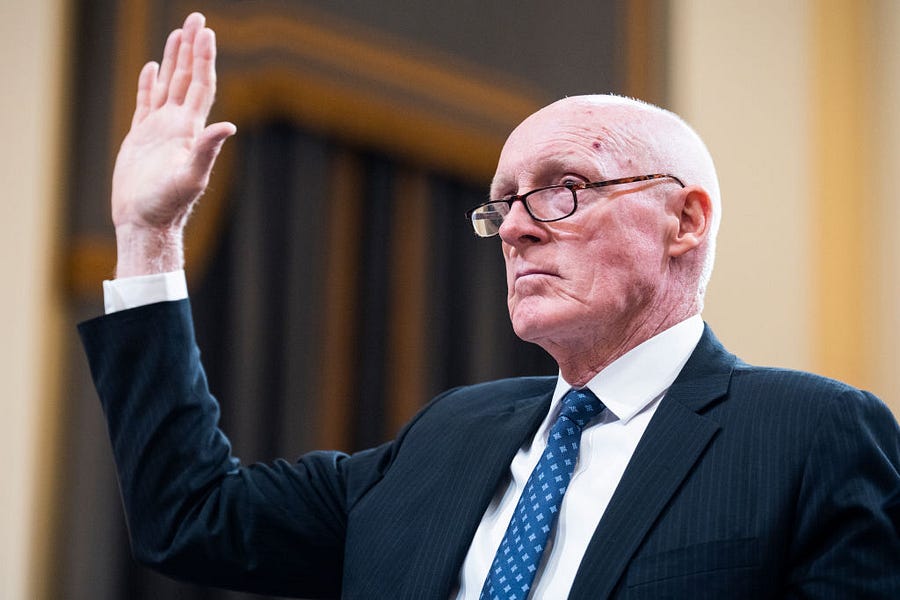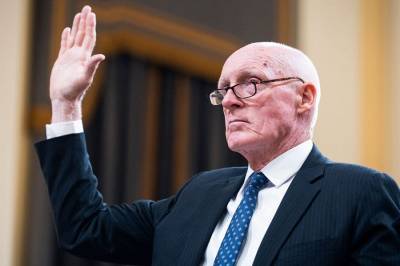Happy Wednesday! Kellogg’s announced yesterday it plans to split itself up into three independent companies, the largest of which will focus on “global snacking.”
We’re hearing the new entities will be run by Snap, Crackle, and Pop.
Quick Hits: Today’s Top Stories
Katie Britt—the former chief of staff to retiring Sen. Richard Shelby—defeated Rep. Mo Brooks in a runoff election on Tuesday after neither secured more than 50 percent of the vote in Alabama’s Republican U.S. Senate primary last month. And after a runoff and a recount, Rep. Henry Cuellar—the last pro-life Democrat in the House—narrowly edged out progressive attorney Jessica Cisneros to win the Democratic primary in Texas’ 28th District.
The Supreme Court ruled 6-3 on Tuesday that Maine violated the Constitution’s Free Exercise Clause when it excluded religious private schools from a tuition voucher program for parents who live in school districts without a public secondary school. “A State need not subsidize private education,” Chief Justice John Roberts wrote for the majority, citing a previous opinion. “But once a State decides to do so, it cannot disqualify some private schools solely because they are religious.” Justices Stephen Breyer, Elena Kagan, and Sonia Sotomayor dissented.
Bipartisan Senate negotiators on Tuesday released the legislative text of a bill aimed at reducing gun violence that, if enacted, would block domestic abusers in dating relationships—not just married, cohabitating, or co-parenting ones—from owning or buying guns until five years pass without further disqualifying convictions. The legislation also includes stricter background checks for gun purchasers under age 21, incentives for states to adopt “red flag” laws, and funding for mental health and school safety measures. Senate Minority Leader Mitch McConnell endorsed the proposal on Tuesday as a “commonsense package of popular steps,” likely ensuring its passage despite some Republican opposition.
The National Association of Realtors reported Tuesday that the median existing-home sales price in the U.S. reached a record $407,600 in May—up 14.8 percent from a year earlier—while sales of previously owned homes declined for the fourth straight month due to rising interest rates and those higher prices.
Louisiana’s Democratic Gov. John Bel Edwards signed a bill into law on Tuesday, that, in the event the Supreme Court strikes down Roe v. Wade, would prohibit all abortions in the state except in cases of ectopic pregnancy or miscarriage, or the procedure is deemed medically necessary to save the life of the mother. Pregnant women would not be criminally prosecuted under the law, but abortion providers would face up to 15 years in prison and a $200,000 fine depending on the timing of the procedure.
Meta reached a settlement with the Justice Department on Tuesday to resolve a lawsuit filed in 2019 that alleged the social media company’s advertising algorithms illegally discriminated against Facebook users by targeting housing ads based on their race, gender, religion, disability status, and ZIP code. Meta has since eliminated many of those targeting options, and under the terms of yesterday’s agreement, it will pay a $115,054 fine and introduce a new technology for housing, employment, and credit ads to ensure they are distributed equitably.
The White House announced Tuesday the United States will recommit to an Obama-era initiative limiting the use of anti-personnel landmines (APL), which it said have a “disproportionate impact on civilians, including children, long after fighting has stopped.” The decision does not apply to the Korean Peninsula due to “unique circumstances,” but Bureau of Political-Military Affairs official Stanley Brown told reporters APLs haven’t been used by American forces in “any significant way” since the Gulf War.
‘I Will Not Play With Laws I Swore Allegiance To’

Four hearings in, the overall purpose of the public hearings of the House January 6 Committee is clear: to remind you how much more outrageous and unforgivable former President Donald Trump’s brazen attempt to steal the 2020 election was than how you remember it. In that respect, Tuesday’s hearing, featuring the testimony of state and local officials the president’s team tried to malign or manipulate, might have been the most successful one yet.
First, there was news: The committee shared unsettling new details of just how hard the Trump campaign tried to subvert the entire structure of American electoral democracy, working to organize “alternate” slates of electors in swing states that had gone for Biden while leaning on state and local officials to endorse his charade. Numerous witnesses from multiple states testified that such “alternate” slates made plans to empanel themselves and vote for Trump in several states, including Arizona, Michigan, and Wisconsin.
These were no fringe actors. According to the prerecorded testimony of Republican National Committee Chair Ronna McDaniel—a Trump partisan so enthusiastic she reportedly changed her name at his behest—Trump and lawyer John Eastman had called the RNC “to talk about the importance of the RNC helping the campaign gather these contingent electors in case any of the legal challenges that were ongoing changed the result of any of the states.”
Team Trump wasn’t just coordinating with these extralegal faux electors. The president and some of his top aides were actively working to wheedle state officials to bring them forward. One of these Republican state officials was Rusty Bowers, speaker of the Arizona House of Representatives, who testified that another of Trump’s lawyers, Rudy Giuliani, had pressured him to “decertify the election, because we had plenary authority to do so.” When Bowers protested that he did not have that authority, he said, Giuliani waved him off, telling him to “just do it and let the courts figure it all out.”
Even as Trump’s advisers were cajoling Republican officials to do them a solid and overthrow the election, they weren’t being fully honest with those officials, others testified Tuesday. According to former Wisconsin GOP Chair Andrew Hitt, the Trump campaign insisted it was merely attempting to scrape together alternate electors so it would have them ready to go, if and when it succeeded in its legal challenges to the election results. But in the end, despite losing every legal challenge, Trump tried to pressure Vice President Mike Pence to accept the “alternate” electors anyway—which, according to Hitt, “would have been using our electors in ways that we weren’t told about, and we wouldn’t have supported.”
All this was alarming. But most of Tuesday’s time was dedicated to illustrating the human toll of Trump and Co.’s election lies. For declining to go along with Trump’s plan for Arizona, Bowers faced a dismaying barrage of conspiratorial hate. He testified that MAGA protesters came to his neighborhood to accuse him of being “a pedophile and a pervert and a corrupt politician,” arguing with his neighbors and scaring his family. He read an entry from his personal journal that he had written in the heart of the madness in December 2020:
It is painful to have friends who have been such a help to me turn on me with such rancor. I may in the eyes of men not hold correct opinions or act according to their visions or convictions. But I do not take this current situation in a light manner, a fearful manner, or a vengeful manner. I do not want to be a winner by cheating. I will not play with laws I swore allegiance to, with any contrived desire towards deflection of my deep foundational desire to follow God’s will as I believe he led my conscience to embrace. How else will I ever approach him in the wilderness of life, knowing that I ask this guidance only to show myself a coward in defending the course he led me to take?
Still, at least Bowers signed up for a public-facing life. Others who found themselves in Trump’s crosshairs had done nothing more than show up for the job. Two Fulton County election workers, Shaye Moss and her mother, Ruby Freeman, testified about how Giuliani had baselessly accused the two of them—by name—of smuggling suitcases of fraudulent ballots into their workplace.
“It’s obvious to anyone who’s a criminal investigator or prosecutor that they are engaged in surreptitious, illegal activity,” Giuliani said during a Georgia Senate hearing committee at the time. “They should have been questioned already. Their homes should have been searched for evidence.”
Trump, too, zeroed in on the pair in a call with Georgia Secretary of State Brad Raffensperger, calling Freeman a “professional vote scammer and hustler.”
Moss testified that the newfound notoriety changed her life forever—she stopped leaving her home even for basic errands, terrified that strangers would confront her in stores or in the street. And Freeman testified about her indignation that signing on to do the work of a democratic election would make her a target for a democratically elected president:
There is nowhere I feel safe. Nowhere. Do you know how it feels to have the president of the United States target you? The president of the United States is supposed to represent every American, not to target one. But he targeted me, Lady Ruby. A small business owner, a mother, a proud American citizen. Who stood up to help Fulton County run an election in the middle of a pandemic.
Katie Britt to Succeed Alabama Sen. Richard Shelby
GOP Rep. Mo Brooks ended his campaign for retiring Alabama Sen. Richard Shelby’s seat with fighting words, at least for today’s Republican Party. “It’s quite clear that Donald Trump has no loyalty to anyone or anything but himself,” he told AL.com in an interview last week.
After no candidate received the requisite 50 percent of the vote in Alabama’s Republican U.S. Senate primary last month, the top-two finishers—Brooks and Katie Britt, Shelby’s former chief of staff—advanced to a runoff, which Britt ran away with last night, defeating the six-term congressman by a whopping 26 percentage points. She’s now on track to be elected Alabama’s first-ever female U.S. Senator in November, when she will face Democratic nominee Will Boyd in a state Shelby carried by 28 points during his most recent reelection campaign in 2016.
Last night’s election results are a boon to Britt’s army of high-profile Republican endorsers, including Sens. Tom Cotton, Tim Scott, and Joni Ernst, former White House press secretary Sarah Huckabee Sanders, and the former president himself, who formally threw his weight behind her campaign earlier this month after rescinding his endorsement of Brooks in late March. Although Brooks was one of the lead proponents of Trump’s efforts to overturn the 2020 election results—speaking at the “Stop the Steal” rally near the White House on January 6—Brooks told rally goers last August it was time to put all that behind them. And when Brooks started slipping in the polls earlier this year, Trump cut bait, eventually gravitating to Britt once she had established herself as the frontrunner. (Britt has said there “was fraud” in the 2020 election and called for a “forensic audit” but stops short of saying it was stolen.)
There’s clearly no love lost between Trump and Brooks at this point, but even the former president didn’t have it out for the congressman quite like Senate Minority Leader Mitch McConnell. The McConnell-aligned Senate Leadership Fund (SLF) poured millions into Alabama’s Future, an anti-Brooks super PAC that unveiled attack ad after attack ad against the Alabama congressman’s voting record. Brooks lobbed back with vitriol of his own, blaming McConnell for Trump’s decision to rescind his endorsement (which, given Trump and McConnell’s mutual disdain, seems highly unlikely), and vowing to vote against him as Senate minority or majority leader if elected.
The McConnell-Brooks feud dates back years, as Audrey noted in a piece for the site last month. McConnell—then majority leader—endorsed Luther Strange in a 2017 special election for Alabama’s open U.S. Senate seat, and shepherded millions of SLF dollars into heading off two GOP primary challengers in particular: Mo Brooks and Roy Moore, the embattled former judge who was accused of sexual misconduct. Moore ended up winning the nomination, and losing in the general election to Democrat Doug Jones.
That year’s special election left many Republican lawmakers with a bitter taste in their mouths, including Texas Sen. Ted Cruz, who said in an interview last month that Republican leadership should avoid getting involved in competitive primary races whenever possible. “I always think it’s a mistake when leadership gets involved in primaries, and historically, it’s tended to backfire more often than not,” said Cruz, who endorsed Brooks and campaigned on his behalf ahead of last month’s primary. (Several other Republican firebrands—commentators Sean Hannity and Charlie Kirk, Sen. Rand Paul, Reps. Chip Roy and Marjorie Taylor Greene—continued supporting Brooks as well, with Paul telling voters recently Trump made a “big whopper mistake” in backing Britt.)
Cruz is right that Senate Republican leaders might have something to learn from Moore’s disastrous general election defeat in 2017 despite McConnell’s best efforts to stop him from securing the GOP nomination. But at least when it comes to keeping Brooks in particular from securing the Republican nod for U.S. Senate, both McConnell and Trump are two-for-two. And in Britt, McConnell is likely to get a reliable team player who won’t embarrass the conference.
Outside of Alabama, Trump’s endorsement record grew even more mixed on Tuesday, as two House candidates he backed in Georgia—Jake Evans and Vernon Jones—got trounced by Rich McCormick and Mike Collins, respectively. But if Republican congressional candidates are looking to draw any lessons from last night’s election results, it’s this: If Donald Trump rescinds his endorsement of you and a Mitch McConnell-aligned super PAC spends millions attacking you, it might be time to reevaluate your campaign strategy.
Worth Your Time
Is the U.S. getting more red vs. blue, or us vs. you? Academics Verlan Lewis and Hyram Lewis argue in the Wall Street Journal that debating whether Democrats have moved farther left than Republicans have right flattens myriad shifts in policy stances onto an inappropriately two dimensional spectrum. “Yes, partisans are increasingly angry, tribal and isolated in media echo chambers,” they write. “But to attribute this to positions on a mythical left-right spectrum misunderstands our politics entirely.” Further, they contend that when it comes to polarization, tribalism is a much stronger force than policy commitments. “True, politicians are increasingly breaking the norms of decency, ideologues are increasingly uncivil, protesters are increasingly militant, and increasing numbers of Americans are unwilling to accept the outcomes of elections. But these extreme behaviors aren’t the product of extreme commitment to ideas so much as to political tribes.”
Meet Jenny Cudd, who entered the Capitol Jan. 6 and is now back home in Texas, managing her flower shop, committed as ever to fighting what she sees as voter fraud. “Cudd is serving no jail time after pleading guilty to a misdemeanor charge,” Olga Khazan writes for The Atlantic. “Her life is back to normal. She wakes up in a modest old house and has two cups of coffee with her dogs, Freedom and Justice. Then she heads to her shop, Becky’s Flowers, where customers are greeted with pastel-hued hydrangeas alongside pocket Constitutions, a Donald Trump bobblehead doll, and a painting of Trump holding a vase of flowers. … Though she swears she won’t unlawfully enter any government buildings again, she still thinks the 2020 election was stolen from Trump. And she has become an organizer of the MAGA right in her area, bringing together people from all over West Texas to hear fringe figures pontificate on a range of conspiracies.”
Something Uplifting
Presented Without Comment
Also Also Presented Without Comment
Toeing the Company Line
Stop arguing about which side is worse and start condemning and opposing political violence of all stripes, David urges in the latest French Press (🔒), suggesting Democrats and Republicans start by quitting the whataboutism and selective outrage. “Every single instinct that tells us to excuse, minimize, or rationalize our own side’s misconduct—for fear of giving them ‘ammunition’ in the culture war—pushes us closer to the abyss,” he warns.
Still wondering what to make of last week’s primaries? Sarah and Audrey provide analysis of the key races in The Sweep (🔒), along with a look at the stats on political tweets, a political ad calling for violence, and Rep. Alexandria Ocasio-Cortez’s reaction to the contents of Audrey’s story on Democrats boosting extreme Republicans.
If you didn’t have time to read all of parts two and three of Haley’s series on how the Uyghur Forced Labor Prevention Act became law, check out excerpts in yesterday’s Uphill alongside a preview of this week’s under-the-dome action. Haley also stopped by Dispatch Live (🔒) last night to discuss the Uyghur bill series. Dispatch members who missed the conversation or want to listen again can access a video or audio recording by clicking here.
Sarah and David breeze through Tuesday’s Supreme Court opinions on today’s episode of Advisory Opinions, covering interstate robbery, religious schooling, and Maine’s status as more rural than Alaska (Something this Mainer didn’t know - EE). Also: toddler yoga, skirt skepticism, and how to have fun at work.
On the site today, we have the next installment of Haley’s report on how the Uyghur Forced Labor Prevention Act became law. Andy Smarick explains the Supreme Court’s decision in Carson v. Makin, which said that Maine could not exclude religious schools from its school-choice program, and Jay Nordlinger notes that the professional golfers signing up for the LIV Golf Tour—an upstart promising big payouts and no-cut tournaments—are ignoring the many human rights abuses of Saudi Arabia, which is backing the tour.
Let Us Know
Have you watched any of the January 6 hearings or at least followed the news coverage? If so, how has it changed your perception of Donald Trump’s behavior and actions by his advisers in the months after the 2020 elections?








Please note that we at The Dispatch hold ourselves, our work, and our commenters to a higher standard than other places on the internet. We welcome comments that foster genuine debate or discussion—including comments critical of us or our work—but responses that include ad hominem attacks on fellow Dispatch members or are intended to stoke fear and anger may be moderated.
With your membership, you only have the ability to comment on The Morning Dispatch articles. Consider upgrading to join the conversation everywhere.